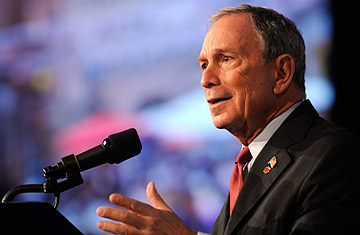
New York Mayor Michael Bloomberg
From a very early age, children in the U.S. are taught — through song — that this land is made for you and me. But what they're not taught — in song or any other way — is that what really matters is the exact plot of land they are born on. In fact, as highlighted by Opportunity Nation, a two-day summit that took place in New York City last week, a child's future is most accurately determined today by the ZIP code in which he or she started life. Those lucky enough to be born in the "right" ZIP codes are set on a path toward lifelong success, whereas the less fortunate — who in some cases may live just down the road — find themselves in communities with a poverty level so deep, they may never escape.
United by the belief that Americans should have a chance to move beyond the limits of their ZIP code, some 200 representatives from business, nonprofits, faith-based communities, advocacy groups and think tanks on the left, right and center, gathered on Columbia University's campus last Friday to raise awareness about a lack of upward mobility in the nation. In his opening remarks, Mark Edwards, executive director of Opportunity Nation, reflected on better times, when someone could have a reasonable shot at reaching a big goal if he or she had an even larger work ethic. "It used to be that all you needed was talent, drive and the boldest of dreams," Edwards said. "But now, the opportunity to scale the walls seems to have ground to a halt."
Throughout the day, speakers like Russell Simmons, Arianna Huffington, Serena Williams, Rick Warren and others echoed Edwards' sentiment. When New York City Mayor Michael Bloomberg took the stage, he spoke about the need to inject the principles of business into government. "We need to find the things that work and the things that don't, and move money from one to the other," he said. Bloomberg also highlighted the need to take on tough issues like immigration reform, which he said often stands in the way of innovation. "The reality is, if we don't fix our country's broken immigration system, the next Google won't be started anywhere near America," he said, garnering applause from the crowd. "You can applaud, but instead pick up the phone and call your representative," he added.
But perhaps the most concrete part of the day — and the one most likely to carry the message forward — was the announcement of the opportunity index later in the afternoon. The index is an interactive Web tool that grades every state and nearly every county on the level of opportunity it provides residents. Using measures like the unemployment rate, median household income, the percentage of the population enrolled in preschool and the percentage of households with high-speed Internet, the index assigns states and counties a letter grade, A through F. The index also allows users to enter an address and learn how their county stacks up against the nation.
The report released in coordination with the unveiling of the index showed that Connecticut, Minnesota, Massachusetts, Vermont and Nebraska provide the most opportunity to residents, while Alabama, Arkansas, West Virginia, Mississippi and Nevada provide the least. Surprisingly, the report found income is not always the best indicator of opportunity. For example, while Nevada has a higher-than-average median household income, it ranks near the bottom of the 50 states in terms of providing opportunity because of low scores in education and community.
Organizers of the event promised to use the information uncovered by the index to spur action by policymakers moving forward. Kevin Jennings, who as CEO of Be the Change was one of the co-conveners of the summit, said he wanted every candidate for the 2012 election to have a plan on the table to address the issues raised at the event. "I don't think we should elect anyone to office next year who doesn't have a plan for how we can increase opportunity," he told TIME. "This is the challenge of our generation."
